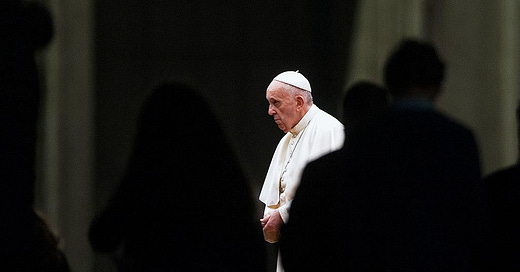Morning Call: Starmer’s night-mayor
Could rebellious local leaders undermine a Labour government?
Good morning. Keir Starmer will meet Labour’s growing cadre of metro mayors today to discuss their “local growth plans”. But could the mayors become centres of rebellion if Labour gets into government?
Then, Sohrab Ahmari asks why world leaders no longer talk about world peace, and Ben analyses the strength of the Reform vote.
Metro mayors have become an immovable feature of British politics. The vision that George Osborne outlined as part of his Northern Powerhouse project in 2014 is being expanded and entrenched. Labour wants new metro mayors across the country. Despite lower turnouts at this year’s local elections, the incumbents are establishing themselves as a counterbalance to the centralised Westminster system. As one senior Labour aide told me, “The model is here to stay and that devolution agenda is something that Keir feels very strongly about.”
Andy Burnham in Manchester took up the anti-Westminster mantle during the Covid-19 pandemic when he theatrically opposed the government’s tiered lockdown system. Andy Street, the former John Lewis CEO and West Midlands mayor, became the flag-bearer for anger over Rishi Sunak’s decision to cancel the northern end of the HS2 high-speed rail line at the Conservative Party conference last year. Amid a throng of eager hacks, Street delivered a disapproving judgement. No other Tory figure commanded as much attention. Although London’s pre-eminence and wealth suggest that the Westminster system has worked well for the capital, Sadiq Khan has pursued a distinctive, progressive path – by promoting drug legalisation for instance, or calling for a ceasefire in Gaza last autumn.
The metro mayors can challenge their party leaders because they have their own mandate. The London mayor has the largest personal mandate of anyone in the UK; Khan received more than one million votes when he was elected for a record third term on 2 May. While many MPs represent their region, the mayors are figureheads. They can use that mandate because they sit outside the party whip system – the informal mechanism of coercion and patronage that ensures MPs vote with their leadership. At the same time, the media is becoming accustomed to platforming devolved leaders in a way it does not council leaders.
Since much of the mayoral system has been in place, the Conservative Party has been in power. Now, the mayors – of whom 11 out of 12 are from Labour – face a Keir Starmer government. Will this lead to cooperation and harmony? Or to antagonism and conflict?
Within days of their election on 2 May, two Labour metro mayors made major policy interventions. First, Andy Burnham called for the government to scrap the Thatcher-era Right to Buy scheme to bolster Manchester’s housing supply. The problem is this isn't Labour policy: that evening, the shadow chancellor Rachel Reeves dismissed the idea. “It’s an incoming Labour government that would determine the rules around Right to Buy,” she said. “We have no plans to reform that… I don’t think it’s up to a mayor to suspend the Right to Buy scheme.”
The same day, Richard Parker called for the UK to suspend arms sales to Israel having narrowly won the West Midlands mayoralty by 0.3 points (the pro-Palestinian independent Akhmed Yakoob won 11 per cent of the vote). Foreign policy does not fall within the purview of the West Midlands mayoralty. The official Labour line is that the government should release its legal advice on an arms embargo. And yet, Parker, anxious about his narrow mandate and free from the parliamentary enforcers, chose to intervene.
The potential for discord is clear. The mayoral structure provides fertile ground for disagreement over policy and fiscal constraints. Local government is impoverished. After years of central government cuts and financial mismanagement, it lacks the money to deliver the services that many people judge to be key functions of the state. Take social care. Labour wants to boost social care workers’ pay through collective bargaining. But there is no commitment to give councils the money to fund a higher wage bill.
This is one example of a broader problem: the return of austerity. Reeves’s decision to broadly accept the Tories’ spending plans means cuts of 4 per cent to non-protected departmental budgets are pencilled in for after the general election. Austerity means more to local government than most: councils have seen funding from Westminster cut by 40 per cent in real terms since 2010. Birmingham and six other councils have effectively declared bankruptcy since 2018 (some more than once). Any move to make further cuts could trigger a broader backlash. Labour’s decision to stick with the Tories’ economic framework has allowed the mayors, many of whom sit to the left of the national party, to become the leaders of an anti-austerity resistance.
Then there are the personalities. Ask one of Starmer’s aides about Burnham, for instance, and they will release a barrage of abuse. The Greater Manchester mayor is viewed by some in Labour as an opportunistic huckster, someone who will take any political line to become leader. Burnham reportedly refused to endorse Starmer in the 2020 leadership contest. The animosity runs both ways. In 2021, Burnham asked Starmer’s office to halt the briefings and “leave me alone”.
To soothe these wounds, Sue Gray, Starmer’s chief of staff, has facilitated meetings between the leadership and the mayors. I'm told those meetings still happen fortnightly, with other frontbenchers joining when appropriate. Reeves spoke with Burnham during the campaign and is also in touch with Khan, Parker and Tracy Brabin in West Yorkshire.
Indeed, some Labour sources view the mayors as vital incubators for policy. Others think they demonstrate what Labour can do in power, such as taking Manchester’s bus network into public control. “It won’t be as simple as pushing a Starmer government to the left,” one aide said. “They’ll be able to try different policies and we’ll be able to look at what’s working.”
Today, Starmer, Reeves and the deputy leader Angela Rayner will meet the mayors to discuss Labour’s plans for regional growth – a sign the leadership recognises the importance of these relationships, or at least the dangers if they deteriorate.
The dire inheritance Starmer and Reeves could receive in government means that their first term might be riddled with instability. Growth underpins nearly their entire programme. But if it does not materialise, and they are seen to have merely delivered a return to a normality that few support, then the mayors could lead pockets of revolt against the Westminster government.
Follow the New Statesman Podcast on Apple Podcasts for all the latest political analysis:
Freddie’s picks
Jonn Elledge was not surprised that Keir Starmer warmly welcomed Natalie Elphicke into the Labour Party.
The academic Katy Shaw writes this week’s diary on how devolution is working, but levelling up is not.
Caroline Lucas has written an essay on why English appreciation for nature does not guarantee respect for nature.
“From being a spiritual solution, [culture] has become part of the problem.” Terry Eagleton asks: where does culture come from? (London Review of Books).
Whatever happened to the language of peace?
In a sit-down interview with CBS News last month, Pope Francis was asked if he had a special message for Vladimir Putin on Ukraine. Deflecting the question’s partial framing, the Roman pontiff addressed himself instead to the leaders of “countries at war, all of them”, pleading: “Stop the war. Look for peace. A negotiated peace is better than a war without end.”
Speaking the simple but powerful language of peace is nothing new for the modern popes. What’s notable about our moment is how Francis finds himself almost entirely alone among world leaders in urging humanity to beat swords into ploughshares; and how, among elite Western opinion especially, his calls are greeted with indifference – that is, when they aren’t met with outright hostility and accusations of “appeasement”.
Compare this to the reception of Pacem in terris, Saint John XXIII’s encyclical on “universal peace” published more than 60 years ago, in which the pope emphasised “negotiation” and “agreement” as the best means for resolving interstate disputes, and hailed the United Nations for helping to secure “the universal common good”. Pacem in terris came amid the nuclear drama of the Cold War, which pitted the West against a Soviet Union overtly hostile to the interests of the Catholic Church. Yet far from being ignored, the encyclical was reprinted in the New York Times.
Click through to the NS to read the rest, or MC subscribers can read in full in-email.
Keep reading with a 7-day free trial
Subscribe to Morning Call to keep reading this post and get 7 days of free access to the full post archives.









